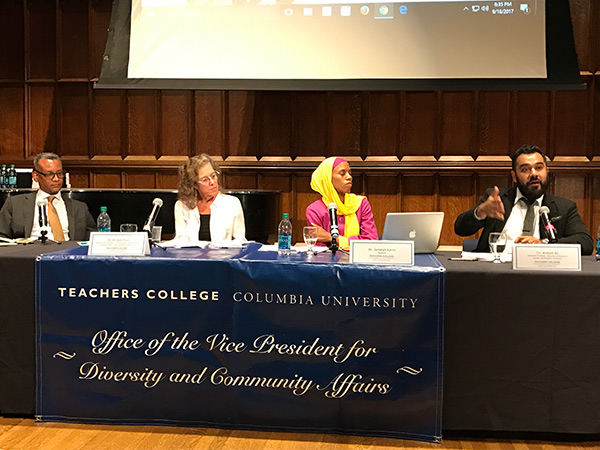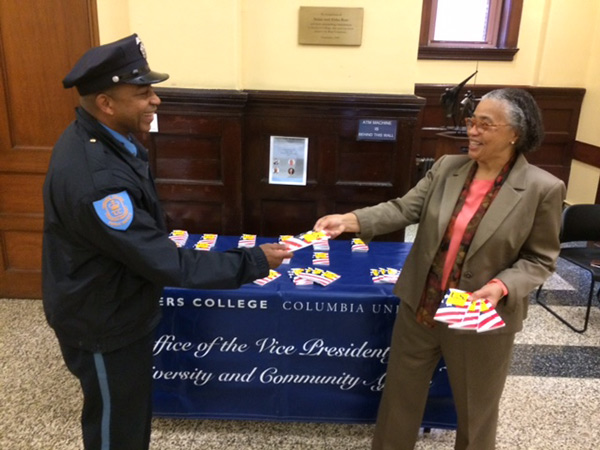Times that Try Our Constitution: A TC panel spotlights threats to the rights of immigrants and Muslim Americans

“I’m not going to sugarcoat it,” declared Vincent Warren, Esq., Executive Director of the Center for Constitutional Rights to an audience in Milbank Chapel. “We’re in a very deep hole.”
That dire assessment about the health of what some view as the most influential document ever written set the tone for a two-hour discussion on “DACA (Deferred Action for Childhood Arrivals) Youth, Muslim Communities and Immigrant Rights: Discourses and Challenges in U.S. Democracy.” The event was sponsored by TC’s Office of the Vice President for Diversity and Community Affairs, which distributed copies of the U.S. Constitution to arriving students, staff and faculty on Monday morning.
“There is something very sobering about a country that shows a group of young people that they don’t belong.”
—Michelle Fine
DACA is an Obama administration federal policy that gave some 800,000 people who entered the country illegally as minors a renewable two-year stay of deportation and eligibility for a work permit. DACA was instituted by President Obama’s executive order in lieu of winning Congressional passage of the DREAM Act, which would have more fully codified the same protections. Earlier this month, the Trump administration rescinded DACA effective March 5th, 2018. In a recent message published on TC’s home page, TC President Susan Fuhrman called that action “a grave and unjust decision” and pledged that TC would join with other college and universities in “opposing the repeal of DACA” and “urging Congress to pass bipartisan legislation that permanently maintains DACA’s protections for all ‘Dreamers.’”

Karim, a former Spelman College Professor of Religion and the author of American Muslim Women: Negotiating Race, Class and Gender with the Ummah, said the national mood is arguably worse than the backlash against Muslims that followed the 9/11 terrorist attacks.
“9/11 was a wake-up call and this continues to be a wake-up call about how racism works in this country,” said Karim, adding that the 2016 campaign and its aftermath again raises the question of “how to be both an American and a Muslim.”
“One of the promises of the moment is that we are seeing solidarity across communities.”
—Arshad Ali
Fine, a leading social activist and the Distinguished Professor of Critical Psychology, Women’s Studies and Urban Education at the CUNY Graduate Center, said research confirms the marginalization of Muslim Americans who have come of age since 2001.
“There is something very sobering about a country that shows a group of young people that they don’t belong,” Fine said. “I am watching the curdling of a sense of belonging among young people who thought this was their country.”
Warren cautioned Dreamers and other DACA supporters from reading any encouragement into Trump’s seemingly shifting stance on DACA in recent days, citing the aggressive enforcement stance of the Sessions Justice Department.
“It is what we call in legal terms ‘a hot mess,’” he said.
What can be done to create a more positive climate for immigrants and Muslim Americans? The panelists agreed it is imperative for educators to illuminate the dangers of “fake news” and to spotlight oppression of minorities.
“We have an obligation to speak aloud,” Fine declared.
Ali, an Assistant Professor of Educational Research at George Washington University and a former TC Minority Postdoctoral Fellow, noted that resistance and heightened awareness of abuses of immigrants are among the upsides of current federal actions and rhetoric:
“One of the promises of the moment is that we are seeing solidarity across communities.” – Steve Giegerich
Published Thursday, Sep 21, 2017